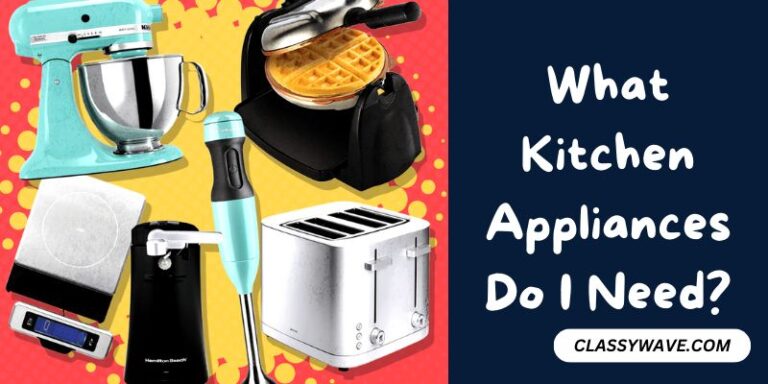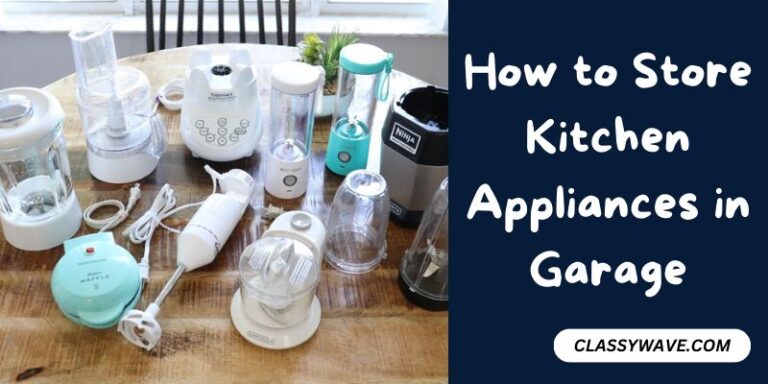How to Extend Appliance Lifespan | Classy Wave
Home appliances make life easier — from keeping our food fresh to washing our clothes and dishes. But like everything else, they have a limited lifespan. The good news? With proper care and maintenance, you can significantly extend how long your appliances last. Let’s explore some smart, simple, and practical ways to help your household machines stay efficient and reliable for years.
1. Read and Follow the User Manual
It might sound basic, but reading the user manual is the first step in appliance care. Manufacturers provide specific instructions about how to use and maintain their products. Following these guidelines helps prevent misuse and ensures your appliance runs as designed.
2. Keep Appliances Clean
Dust, grease, and grime are silent killers of appliance performance.
- Refrigerator: Clean coils every 3–6 months to improve cooling and efficiency.
- Washing machine: Run a cleaning cycle monthly to remove detergent buildup.
- Microwave and oven: Wipe spills immediately to prevent hard stains or damage to interior coating.
A regular cleaning routine prevents wear and tear and keeps appliances looking and functioning like new.
3. Avoid Overloading
Overloading appliances is one of the most common mistakes homeowners make.
- Don’t stuff your washing machine beyond its capacity — it strains the motor and suspension.
- Avoid overfilling refrigerators; airflow is essential for cooling.
- Never overload your dishwasher; it prevents proper cleaning and increases water usage.
Stick to recommended load limits to avoid unnecessary strain.
4. Regular Maintenance Checks
Just like your car, your appliances need periodic checkups.
Schedule a maintenance routine every few months to inspect for signs of wear, leaks, or loose parts. A small fix early on can prevent costly repairs or total replacements later.
5. Use the Right Cleaning Products
Harsh chemicals can damage sensitive appliance surfaces and internal components. Always use mild detergents or manufacturer-recommended cleaning agents. For example, vinegar and baking soda are excellent natural cleaners for most kitchen appliances.
6. Keep Appliances in Proper Conditions
Environmental factors matter.
- Avoid exposing appliances to moisture, especially electronics like microwaves or air conditioners.
- Maintain room temperature for refrigerators and freezers to reduce compressor strain.
- Ensure proper ventilation around appliances to prevent overheating.
7. Replace Filters and Parts on Time
Air conditioners, water purifiers, and dryers all rely on filters to function efficiently. Clogged filters make them work harder, shortening their lifespan.
Replace or clean filters regularly based on the manufacturer’s instructions. The same goes for gaskets, hoses, and seals — check them periodically for cracks or leaks.
8. Don’t Ignore Warning Signs
Unusual noises, reduced performance, or error codes are your appliance’s way of asking for help. Ignoring these signs can lead to bigger issues. Address problems early — it often saves money and extends the machine’s life.
9. Use Energy-Efficient Settings
Most modern appliances come with eco or energy-saving modes. Not only do these settings reduce your electricity bill, but they also minimize stress on internal components. For example:
- Use cold water cycles for washing clothes.
- Run the dishwasher on eco mode.
- Avoid running appliances unnecessarily or at full power constantly.
10. Ensure Stable Power Supply
Sudden power surges can damage sensitive components in appliances. Using surge protectors for electronics like TVs, refrigerators, and computers helps shield them from voltage spikes. If possible, unplug appliances during thunderstorms or long periods of non-use.
11. Give Appliances Rest Time
Running appliances continuously without rest leads to overheating. For example, don’t run your vacuum cleaner for an hour straight — give it short breaks. Similarly, avoid keeping your washing machine or dishwasher running back-to-back cycles.
12. Store Appliances Properly When Not in Use
If you’re not using an appliance for a while, clean it, dry it completely, and store it in a cool, dry place. Wrap cords neatly and protect from dust. Proper storage prevents corrosion and damage to electrical parts.
13. Use Professional Repair Services
DIY fixes are tempting, but not always safe or effective. For complex issues, call a certified technician. Professional repair services use genuine parts and ensure proper handling — both crucial for extending your appliance’s lifespan.
14. Keep an Appliance Maintenance Schedule
Create a checklist for your home appliances.
- Monthly: Clean filters, check for leaks.
- Quarterly: Deep clean interiors, inspect cords.
- Annually: Schedule professional servicing.
Staying organized ensures no appliance is neglected.
15. Upgrade When Necessary
Sometimes, replacing an old, inefficient appliance is better than constant repairs. Newer models often come with energy-saving technology that reduces utility bills and maintenance needs. If an appliance is costing too much to repair, upgrading might actually save you money in the long run.
Conclusion
Extending the lifespan of your appliances isn’t rocket science — it’s all about consistent care, smart usage, and timely maintenance. By following simple habits like cleaning regularly, avoiding overloads, and fixing minor issues early, you can keep your appliances running efficiently for years. Not only will this save you money, but it also helps reduce electronic waste and protect the environment.







